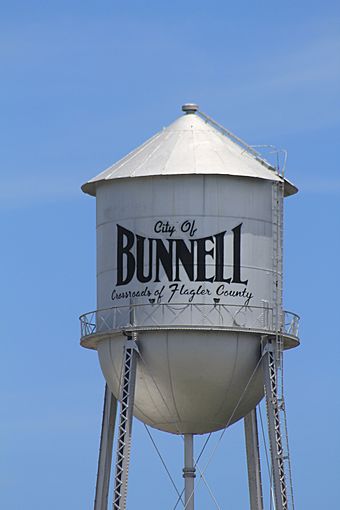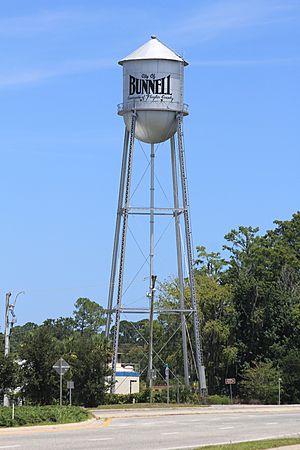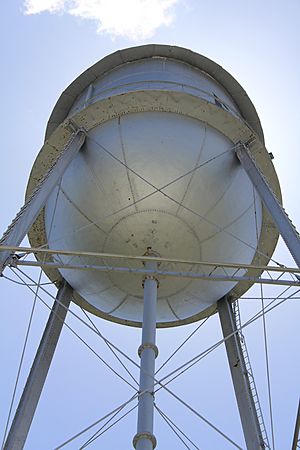Bunnell Water Tower facts for kids
Quick facts for kids |
|
|
Bunnell Water Tower
|
|

Bunnell Water Tower - West Side View of Elevated Tank.
|
|
| Location | 100 Utility Street, Bunnell, Florida |
|---|---|
| Area | 3.728 |
| Built | 1926 (Erected in 1927) |
| Architect | Chicago Bridge & Iron Company |
| Architectural style | Early 20th Century Elevated Steel Water Tower |
| NRHP reference No. | 100003407 |
| Added to NRHP | 4 February 2019 |
The Bunnell Water Tower is a tall, important landmark in Bunnell, Florida. You can find it at 100 Utility Street. This huge steel tower was built in 1926 by the Chicago Bridge & Iron Company. It became part of Bunnell's new water system in December 1927.
Since then, it has been supplying water to homes and businesses in the city. The tower stands 110 feet (about 33.5 meters) tall. Its large steel tank can hold an amazing 75,000 gallons (about 283,900 liters) of water! The tank has a pointed top and a rounded bottom. It stands on four strong steel legs with criss-cross braces for support. On its sides, you can see "City of Bunnell, Crossroads of Flagler County" painted in black.
Contents
Building Bunnell's Water System
In 1927, Bunnell decided to build a brand new water system. This was a big project for the growing city. They needed a reliable way to get clean water to everyone.
Finding Good Water
First, the city hired a company to drill wells. They drilled about 90 feet deep to find water. The water was then tested by the Florida State Board of Health. They said the water was "fine quality," pure, and had no color or taste. It was perfect for drinking! To make sure there was enough water for the city as it grew, a second well was drilled.
Starting Construction
After finding the water, the city asked companies to bid on building the rest of the water system. Many companies wanted the job. In April 1927, the city chose the Hopper Construction Company.
Materials for the new water plant started arriving in July 1927. The construction moved very quickly. By September, most of the main water pipes and fire hydrants were installed. Workers from the Chicago Bridge & Iron Works were busy building the tall steel water tank and its tower.
Overcoming Challenges
The project faced a few small challenges. One pump was going to arrive late. However, the city found a way to connect the new system to the old water source temporarily. Also, they needed to cut into State Road No. 4 to lay pipes. The city leaders worked with the state road engineer to make sure this went smoothly. They agreed to cover the trenches with concrete after the pipes were in place.
Bunnell's New Water System Starts
On December 12, 1927, a very important day arrived for Bunnell. The city's new waterworks system officially began operating! Almost immediately, the old water lines were turned off. All homes and businesses were connected to the new, modern system.
A local newspaper, The Flagler Tribune, called it "one of the most important events ever to occur in Bunnell." The new system was a huge improvement. It included miles of new water pipes of different sizes laid throughout the city streets. There were also new fire hydrants, the tall elevated steel water tank, a large storage reservoir, and a pumping station.
To ensure the water stayed clean and safe, samples were taken every month. These samples were sent to the Florida State Board of Health for testing. Reports showed that the water's quality was "very good."
How the Tower is Used Today
Even after more than ninety years, the Bunnell Water Tower is still used every day! It plays a vital role in providing water to the City of Bunnell. It is especially important during emergencies. If the city's electricity or generators go out, the tower can still provide water pressure. This is because it uses gravity to push water down from its high tank. The city's two modern ground storage tanks, which hold 350,000 gallons each, cannot provide enough water pressure without power.
The Bunnell Water Tower is checked every year to make sure it's in good condition. It also gets a fresh coat of paint every five years to keep it looking good and protected.
A Historic Landmark
The Bunnell Water Tower is not just important for water; it's also a historic landmark!
In November 2018, the Florida National Register Review Board approved its nomination. This meant they thought it was important enough to be added to a special list. The nomination was then sent to the U.S. Department of the Interior, National Park Service for final approval.
On February 4, 2019, the Bunnell Water Tower was officially added to the National Register of Historic Places. This listing recognizes its historical importance and unique design.
 | Misty Copeland |
 | Raven Wilkinson |
 | Debra Austin |
 | Aesha Ash |





